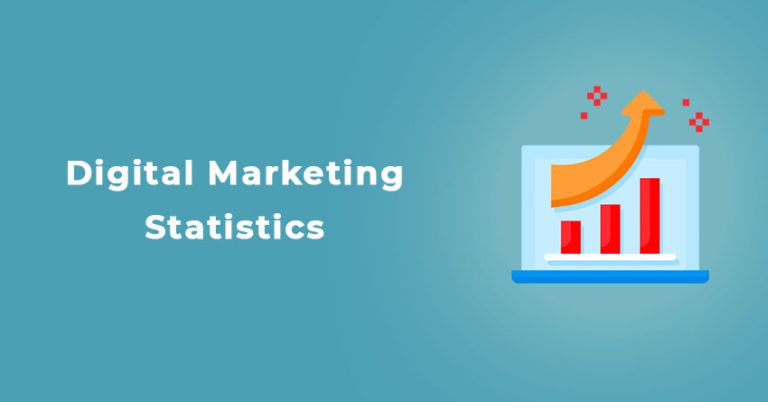Content marketing is shifting paradigms faster than ever.
Wonder why?
Lockdowns have altered consumer behavior from top to bottom. Businesses that thrived on all platforms online with their unicorn content marketing statistics are now constantly evolving to retain their existing as well as new customers.
Credits – Competera
With that said, it’s crucial to formulate the content marketing strategy for your business following the latest search engine updates.
Therefore, in this article, we have rounded up the most important content marketing stats which you could use to capitalize and improve your online presence as well as the lead generation game.
Here are 50 + content marketing stats for 2021 that you need to know.
Top 10 Content Marketing Statistics & Trends
Credits – Smart insights
- 56% of all businesses around the world have plans to spend more on targeted content creation as part of their brand awareness & marketing campaigns.
- 76% of marketers use organic traffic as a measure of the efficiency and success of their content strategy.
- 49% of all marketers are creating content that aligns with the buyer’s perception and intent. In short, content marketing is leaning towards being more customer-centric.
- According to a report by Semrush, long-form articles over 3,000 words tend to dominate the SERPs and received 3X more traffic than normal short blog posts.
- The popularity and user retention due to Infographics has risen to an astounding 800% in the past year.
- 73% of all businesses online have an efficient & highly skilled team for content creation alone.
- Most popular blog posts that rank higher use a mix of 13% Lists, 10% Q&A and 5% How-Tos.
- 84% of B2B businesses are outsourcing their content. The most popular platforms for outsourcing were Fiverr and upwork.
- 56% of the top marketers confirmed that listicles received 2x more traffic than normal block-based blog posts.
- 69% of Marketers say that a well-formulated content strategy is far superior to email marketing and direct offline pitching.
What Are Your Main Content Marketing Goals?
In the absence of well-defined goals and tactically formulated prospects, your content might just revert as noise. Plain noise that neither you nor your customer would be satisfied with.
Credits – Content Marketing Institute
Whether you’re cooking up a blog post or creating content for a well-detailed FAQ page for your business, it’s crucial that identify and define the goals and outcomes you wish to obtain from every single piece of content you put out there.
Though there is a multitude of factors to consider while defining the goals for any business, here are 4 solid goals any business should focus on:-
Brand Awareness
This is the ultimate goal for every content marketing strategy out there. At the end of the day, the customer should be aware of the presence of your business and how your service would benefit the customer.
Credits – Unsplash
A well-researched, high quality, purposeful content does the trick. An authentic content section showcases your company’s expertise in the services provided and enables you to stand out from the competitors.
Here are the interesting content marketing statistics that validate why brand awareness is the key to building a strong reputation for your business.
- 77% of B2B marketers say strategic content creation was the key to building their brand name and performance over the years.
- 70% of businesses find audience building via content marketing more important than converting sales.
- 61% of millennial consumers expect brands to be consistent on all major platforms.
- Consistent brand presence through content marketing can increase the revenue by 23%.
- 82% are more likely to buy from brands after cross-checking their online presence and service/product expertise.
Customer Education/Sales Support
An in-depth and informative piece of content could turn hesitant customers into happy leads. And lucky for you, content marketing happens to be one of the most efficient ways to educate potential customers.
Credits – Gingercup
You could start by creating articles based on the questions your sales team hear from the customers. Not only does this solve their queries, but customers also begin to trust your expertise and form an innate bond with your brand name over time.
Here are a few stats to help you get a wider perspective on the importance of customer education –
- According to a Newvoicemedia study, US brands lose approximately $62 billion worth of revenue due to poor customer service.
- Poor communication and lack of adequate content marketing were found to be the core reason for customer complaints about a company.
- 77% of educated customers were found to spread the word with their friends and family.
- From 1000s of consumers from another survey, 65% said they ended their relationship with a brand due to misguiding FAQs.
- Self-service tools such as FAQ pages or chatbots were the most demanded enhancements with 70% of customers expecting a pre-written query tool within the buyer’s journey through a company’s website.
Building Reputation with Search Engines
This is indeed the #1 reason to create a content marketing strategy for your business. After all, at the end of the day, the whole purpose is to drive valuable leads who would be the potential customers for tomorrow and the days to come.
Credits –Connectionsafe
This requires the content to be properly structured and optimized as per the SEO guidelines to dominate your niche and rule the SERPs.
- In 2021 (to date), Google accounted for just over 70% of all global desktop search traffic, followed by Baidu at 13%, Bing at 12%, and Yahoo at 2%.
- 57% of Marketing experts say that On-Page SEO is the most reliable SEO Tactic at the moment.
- On the first page alone, the first five organic results account for 67.60% of all the clicks.
- 55% of all households are predicted to own a smart home by 2022.
- “Where to buy + Near me” queries have grown to 200% over the past few years.
Content Marketing Statistics
Now that you might have a fair perception of how content marketing works, here are 50+ top content marketing statistics that can be used to your advantage for all your upcoming content marketing endeavours.
Content Marketing Usage
Let’s begin with stats on content marketing usage. Does it work? Do all the long hours of creating high quality authentic content result in potential leads? Does your targeted content reach the right audience?
Credits – Business Insider Intelligence
Check out these statistics on content marketing usage to see if you’re on the right path –
- According to a study conducted by Hubspot, 70% of internet users would rather get information about a company or a product from an article or a blog post rather than a traditional advertisement.
- 32% of the consumers check a brand’s social media presence before they direct themselves to their website.
- More than 80% of the Internet marketing would be video from early 2022, as concluded by research conducted by cisco.
- Instagram is the fastest growing platform for driving purchases from video.
- The average blog post published in 2020 is 1236 words long. Marketers whose articles were 2000+ words long reported lesser bounce rate, higher user retention, and the strongest results in SERPs.
Credits – Orbit Media
- The content marketing trends published by the content marketing Institute showed that 91% of B2B customers use articles/blog posts/videos to obtain the best services for their business.
- 88% of content marketers prioritize informational messages over sales messaging in their content marketing campaigns.
- When asked how they would choose a good product online, over 68% of consumers preferred a short video, 15% voted for text-based content, 4% for Infographics and presentations, and 3% for e-books and manuals.
Content Marketing Strategies
Are you aware of the current state of the ever-evolving content marketing industry?
If you’re not, you should be.
It wouldn’t be an ideal practice to stick with your “once-worked golden method” to organically boost your online presence forever. Search engine algorithms hit and roll new updates now and then, such that businesses that don’t constantly keep adapting would be dragged down the SERPs.
Here are the most important strategies as per the latest content marketing statistics in 2021
- A report by the content marketing Institute concluded that 94% of the B2C marketers chose social media marketing and 80% preferred blogs and short articles.
- 38% of bloggers who spent 6+ hours preparing a blog post experienced the strongest results in SERPs along with better user retention and lower bounce rate.
- 53% of users will bounce back from a website if it takes more than 3.5 seconds to load.
- Research by Pointvisible shows that 60% of B2B marketers prefer and are committed to content marketing over any other model for brand awareness.
- 75% of the CMOs believe that custom content is the future of marketing.
Credits – Dragon360
- While 40% of content marketers used stock pictures for their website content, a study shows that original pictures and graphics helped 40% of the marketers attain their targets and goals.
- 32% of all bloggers who reportedly used, analyzed, and altered their content strategies as per the data provided by google analytics reported higher traffic and lower bounce rates.
- 55% of marketers confirm that blog content is their number one inbound marketing priority.
Content Marketing ROI
In very basic terms, ROI stands for the return of investment and content marketing ROI is no different. It’s the revenue generated by a business throughout its content marketing campaigns and activities compared to the amount spent by the company.
Credits – Landerapp
It is indeed a very crucial aspect of any marketing campaign as revenue is directly involved in this process.
So before you set sail to expand your focus on other aspects of the business, it’s recommended that you dig in deeper for possible alterations that can be done to the content marketing strategy which eventually boosts your revenue.
Here are 8 content marketing growth statistics that you need to know about the money aspect in the content marketing Industry –
- The cost of acquiring a new customer via organic traffic through quality content marketing is 15% less than paid channels for SaaS businesses.
- Marketers who prioritize consistent content creation are 13 times more likely to see positive ROI.
- Long-form content (3k – 10k) gets more shares, build more credibility and trust factor than short-form content (1k – 2k).
- 56% of all businesses reported that they want to spend more on content creation due to high ROI both in terms of money and quality leads.
- With video content marketing, Tiger fitness reported a 60% increase in returning customer rates with less bounce rate as well.
- 70% – 80% of all online shoppers avoid paid ads and straightly visit the organic results for buying products online.
- For every dollar spent, content marketing produces 3X more leads.
- 74% of companies found that content marketing improved lead generation, both in terms of quantity and quality.
Content Marketing Spend
In 2021, content marketing has become an inseparable aspect of every business throughout the world. From building an online presence, proving your expertise to creating a high-quality customer community, consistent quality content aligned for the target customer base is the key.
You can’t climb up the ladders of fame and revenue without sowing the seed of credibility through a well-formulated content marketing strategy.
With that said, here are few content marketing facts about the expenditure from the content marketing industry related to advertising for content creation and marketing.
Credits – Content marketing Institute
- 73% of businesses have a designated employee to monitor content creation.
- 72% of companies say content marketing increases leads.
- More than 80% of marketers plan to spend more on content marketing.
- Most successful B2C businesses allocate 40% of their budget to content marketing.
- In 2020, 85% of all US companies with employees count more than 100 invested heavily in content marketing.
- 43% of the B2B marketers say that posting on blogs is the most effective content marketing they produce.
- Content marketing costs 62% less than traditional advertisements and gains 3X more leads.
Content Distribution
Content distribution is the promotion of the created content on multiple platforms through various channels for brand awareness or marketing. These channels can be categorized into owned, earned or paid.
But most brands promote the content in similar formats on almost all platforms/channels. If leveraged effectively, content distribution itself can solely drive tons of sales/leads for the company in the long term.
Credits – Blog.hootsuite
With that said, here are the top content marketing statistics related to content distribution that have resulted in good ROI for businesses over the years:-
- 95% of content used in content marketing is for social media.
- 27% of all internet users say that find new products through paid ads on their social media feed.
- Out of all the businesses on the Internet, 40% have already created a user base on Instagram.
- Over 50 million small businesses are using Facebook pages to connect with their customers.
- Out of all the B2B businesses throughout the web, 64% of B2B marketers resort to PPC or SEM for content distribution.
- The top 3 types of content that B2C marketers use are social media (94%), blog posts (80%) and email newsletters (74%).
- Only 22% of the Millenials want to see the email content from a brand that they support, and 57% of 45-54 years old do. Every brand must know the right channels for their specific audience types.
Credits – Blog.hubspot
- People today have 2X more interaction with brands through their mobile phones than anywhere else.
Tools Used for Content Marketing
When content marketing delivers enough value to the company both in terms of brand awareness and sales ratio when compared to traditional marketing strategy, the question should be why wouldn’t brands spend more on content marketing?
Credits – Qltech
For a start, content marketing was proven to cost 62% less than all other forms of advertising methods present in the current scenario. Hence, it wouldn’t be a wonder to see the big brands spending huge chunks of money on content marketing tools.
Here are some stats regarding the amount spent on specific tools for content marketing in the past few years –
- #1 on the list would be the google keyword planner. Google itself confirmed that 15% of searches are new and have never been searched before. Using this free tool to its full potential could skyrocket your business.
- From a report by Neil Patel, it’s clear that buzzsumo is the #1 tool favoured by content marketers for content discovery and Influencer analysis.
- 42% of all marketers prefer and use HubSpot for blog ideas generation.
- 65% of content marketers resort to quora’s “related questions” to create related content for a given article.
- 32% of all marketers agree that inbound.org, a content marketing aggregator built by marketers for marketers is better than LinkedIn.
- Out of all the businesses on the Internet, click funnels is the 19th popular site chosen by marketers and brands alike for creating marketing sales funnels to convert their users into customers.
- There are currently 413,261 businesses that use Reddit for their content marketing, from the USA alone.
- 18% of marketers choose WordPress as their website content management system (CMS).
Content Marketing Team Structure & Team Size
Daniela Andreevska, Marketing director of Mashvisor says “you have to find the right number of people on your team to assure that this amount of content gets produced.”
It’s crucial for every brand out there to put a balance between hiring only the right number of people for the content marketing team and not impacting the ROI of the marketing campaign on a holistic level.
Credits – Semrush
With that said, here are a few important Marketing stats from expert opinions and collective data on ideal time size and team structure.
- 78% of the companies have a team of 1-3 content specialists.
- 43% of B2B brands say they have a documented content marketing strategy.
- Website analytics tools remain the most used tools in the content marketing industry with a stable 85% – 88% usage rate.
- “The structuring of a team has a lot to do with what the team is prioritizing or deprioritizing”, says Kipp Bodnar from Hubspot.
- Joe pullizi from CMI says, “The managing editor navigates the prospects of any brand’s content marketing team.”
- Hiring a content marketing strategist is crucial to handle the frequently conflicting demands of the editorial and marketing leaders” says Eric Nelson from contently.
- Hiring natural storytellers or journalists would benefit the company’s growth in the long term, says Kyla Lacy from Lessonly.
What Content Performs Best
10 years ago, If you had a business, you could easily rank up your website on the 1st page by stuffing up some keywords. The same goes with social media, it was relatively easy to stay visible and keep your brand image floating everywhere.
Credits – Convinceandconvert
But times have changed, with millions of businesses competing, adapting and constantly evolving by testing with different lead generation strategy across all platforms, it has become harder than ever.
With that said, here are a few content marketing stats on the types of content that tend to perform best on different interactive platforms across the internet.
- 76% of the businesses plan to increase their budget for creating content for interactive platforms.
- 75% of the youngsters consume video content everyday for more than 3+ hours.
- 75% of all customers prefer video over audio content.
- Newsletters are still on the sail, with 81% of businesses expecting a positive ROI every year from email marketing.
- 43% of the B2B marketers say blogging is the most important content marketing they produce.
- 70% of all marketers prioritize content quality over quantity on all platforms.
Blogging and Seo Stats
Over the decades, content marketing and SEO has formed a synergy that has shaped the digital revolution as we see it today.
The more convenient it has become for users to access the content on the Internet, the more competitive it has become for SEOs, brands and businesses to stay afloat in the game of search engines and their constant changes in algorithms.
Here are a few such content marketing stats that point out the latest trends in the field of SEO related to content marketing as well as blogging.
,
- 200 billion WordPress pages are viewed by over 410 million users every single month.
- In 2019, 24% of bloggers/marketers who published content daily reported a significant rise in user base.
- 55% of the marketers say blogging is their #1 source for incoming traffic and sales.
- In 2020, 36% of marketers conducted and published original research, which reportedly increased their credibility and authenticity within their user base. The previous year, it was only 25%.
- Long-form content (Over 3k words) gets higher rankings and more shares than short-form articles (900-1k words).
- 58% of bloggers say they collaborated with influencers for 10-50% of their posts in 2020.
- The average blog post which received a decent amount of traffic in 2019 took 3 hours and 55 minutes to write.
Credits – Orbitmedia
Video Content Marketing
What do you think is the fundamental driving force of being a human?
We crave connection. People like and trust other people. They require the involvement of a conscious medium to buy things from others.
This is the same reason why marketing has evolved from forced sales messages to meaningful conversations with prospects, customers and users alike. This proves why youtube is the most visited website on the entire planet.
In case you still haven’t inculcated video into your content marketing strategy, here are a few stats to make you decide otherwise.
- The average user spends 89% more time on a website with video.
- Video content viewers are 64% more likely to buy than non-viewers.
- 78% of millennials aged 25-34 watch videos on youtube of the product they wish to buy.
- 85% of all businesses used video as a mainstream marketing tool in the year 2019 on all major platforms.
- Youtube is the consumer’s favourite destination for video content in the US at 75%, followed by Facebook at 64%.
- 97% of brands and marketers say that video content has helped them make their target customers have a clear picture of their service or product.
- 64% of consumers report that watching a marketing video on Facebook has influenced a purchase decision.
Audio and Podcast
The human voice has the divine power to convey more meaningful aspects of any topic than the printed words. This is the sole reason why radio was the ultimate source of entertainment for an era of humanity.
For this very reason, you’re missing out on nuggets of gold in the form of customers if you avoid podcasting your content through major platforms like Spotify, Apple podcasts or Google podcasts.
Here are seven important stats that prove why podcasting should be an important aspect of content marketing for any brand, business or marketer alike.
- 55% of all American customers listen to podcasts daily.
- More than 73 million people listen to podcasts every single month.
- Podcasts now account for 28% of total time spent by customers on audio, which places it above all sources of audio on the internet.
- An estimated count of 180 million people was introduced to the term podcasting in the year 2019.
- 17% of marketers plan to incorporate audio into their content marketing strategy in the form of podcasts.
- 94% of people who listen to podcasts are active on every social media channel compared to 81% of the entire population.
- 50% of US customers report being fans of one podcast and 22% consider themselves avid fans.
Mobile Content Marketing
With mobile devices accounting for 50% of the entire web traffic in 2017, compared to a mere 0.7% in 2009, the use of mobile phones has risen to such an extent that mobile optimization has become an inseparable aspect of every content marketing tactic for all brands and businesses in the world.
Credits – Bluecorona
Here are a few more stats that would enable you to comprehend the phenomenal usage of mobile devices by consumers across the world.
- According to Pew research, One in 5 adults in the US is smartphone only, which means they don’t use a desktop for accessing the internet.
- Customers have 2X more interactions with brands on the internet through their mobile than any other devices.
- 53% of all mobile users will bounce back from a particular website if it takes more than 3.5 seconds to load.
- 92% of all mobile search queries derive from google in the year 2019-2020.
- Mobile traffic has a 125% growth rate compared to a poor 12.5% growth in the case of desktop traffic.
- US adults spent an average of 3 hours and 10 minutes on their smartphones daily.
Credits – Emarketer
- 57% of the customers reported they wouldn’t recommend a website to others if it has a poorly designed/optimized mobile site.
B2b Content Marketing
B2B content marketing, as the name suggests is the art of creating and promoting content to your company audience, boost brand affinity and eventually increase sales and leads by appealing to other businesses.
What keeps B2B content marketing apart from other modes is the fact that it’s exclusively for businesses and not for the general public or an individual customer. This is not run-of-the-mill consumer-facing content.
With the rising competition in the B2B sector, you must stay updated with the latest trends and stats in the market –
- 47% of buyers consume 2-4 pieces of content before engaging with a salesperson.
Credits – Isolinecomms
- Top of the funnel content is the type of content created and published on all major platforms, says B2B content teams.
- 63% of content marketers use their strategic and well-formulated content marketing tactics to build loyalty with their existing business clients.
- 62% of B2B businesses successful at content marketing reportedly had a documented content marketing strategy.
- More than 50% of tech buyers say that video is the most useful form of content to get in-depth info about the product/service.
- 89% of the B2B researchers collect details about potential purchases through google.
- In the B2B sector, 64% of the content marketers prioritize building relationships with influencers, brand advocates and journalists.
B2c Content Marketing
In simpler terms, all the traditional ADS you see on TV are B2C marketing. From print ads, television commercials to digital ads, every business that is marketing directly to consumers through various forms of content come under the shield of B2C content marketing.
With millions of businesses competing for dominion in their respective niches, the B2C market scenario is more crowded and competitive than ever.
Let’s now dwell a bit deeper into few statistics from 2020 that provides us with greater insights about the future of B2C content marketing –
- 97% of both consumers and online marketers admit that video helped customers understand their product.
- For every $1 spent on email marketing, B2C businesses receive on average a $42 ROI.
- B2C marketers dedicate an average of 26% of their total budget for content marketing, whereas the most successful content marketers dedicated more than 40% of their budget towards the same.
Credits – Contentmarketinginstitute
- 51% of content consumption comes from organic search results.
- 55% of B2C marketers outsource content marketing.
- Only 33% of the content marketers in the B2C niche reported always utilizing their data in distribution strategies.
- The audio and visual content usage reportedly rose to 69% more for content marketers in the B2C niche for the year 2017 – 2018.





